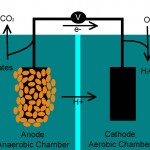
I was there! Not that it was easy. We decided to park in VA (in the parking garage of the National Science foundation - totally by accident) and take the metro in, but evidently the entire world had the same idea; the metro was about a 2 hour wait, and the bus stop had like 3 buses worth of people, and only two buses scheduled in the next hour. So we decided to walk the 6 miles to the National Mall, with less than an hour before the thing started. I was at Obama's inauguration two years ago, and there were screens and speakers all the way to the Lincoln Memorial, but apparently Comedy Central…
[I've been hooked on the immune system since I was a kid and my dad showed me electron micrographs of macrophages eating bacteria in Scientific American. Now that I'm in graduate school studying immunology, and macrophages in particular, my dad asked if I could give a play-by-play of an immune response. Here you go Dad:]
Part 1: Invasion and detection, the innate immune system
Most immunology classes I've taken have begun with a simple, but profound truth: the best immune response is one that prevents pathogens from ever gaining entry (pathogen = disease-causing organism). Hence, we are…
It is an honor and a privilege to be joining ScienceBlogs. Many of the first blogs that I ever read were on this network, and the efforts of PZ, ERV and Orac (among others) to communicate science directly from the lab to readers was in large part what motivated me to start blogging myself. I love the process of discovery that is made possible by science, but I also think that any discovery is useless if it's not communicated to others.
We welcome your comments, questions and criticisms, and hope that you enjoy reading. But first, let me tell you a bit about who we are and what we do.
In 1674…
This post was originally published at webeasties.wordpress.com
Have you noticed the recent spate of people coming down with terrifying bacterial infections contracted at Apple stores? Yeah, me neither. Still:
A leading Australian expert in infectious diseases says people who use display iPads and iPhones at Apple stores are risking serious infections and the company should do more to maintain hygiene[...]
"You wouldn't have hundreds of people using the same glass or cup, but theoretically if hundreds of people share the same keyboard or touch pad, then effectively that's what you're doing,"…
[This post was originally published at webeasties.wordpress.com]
Most papers I read these days are long. Nature and Science papers tend to have 3-4 figures (Cell and Immunity papers can be twice that), tons of supplementary data and are at least a couple pages of dense, science-speak prose. I think I once read a paper (from like 20 years ago) that had a gene sequence as figure 1, a hand-drawn model for figure 2 and one figure of functional data, and I thought that was sparse.
So imagine my surprise when I stumbled on this new paper. One figure. Less than 500 words. And it's about bacteria…
[This post was originally published at webeasties.wordpress.com]
The best defense against pathogens is to never let them gain access to our delicious, gooey insides. Our skin is pretty good for this purpose: it's pretty tough and mostly impermeable, and the only way most of our surface tissues can get infected is if that skin barrier is broken. But we can't have skin everywhere. Our airways and digestive tract have to be permeable so that we can absorb air and nutrients. In our gut, we can't have skin, but we do have tens of trillions of commensal (friendly) bacteria that colonize us, and…
[This post was originally published at webeasties.wordpress.com]
Back in July I wrote about an editorial published in Nature about the future of science communication and what place blogs had in that future. Though I agreed with them that blogs are a great resource, I also thought that they were being a bit disingenuous about their desire to relate with the public considering that almost all of their material is locked behind a paywall, so the public doesn't have access. I even wrote a comment to that effect on their website:
It's all well and good to talk about public accessibility of…
[This post was originally published at webeasties.wordpress.com]
Antibiotics are awesome. They can be credited with saving more human life than any other invention and have been one of the best advancements in public health second only (maybe) to sanitation. But, as with all things pathogen related, the microbes are fighting back. Antibiotic resistance is on the rise, and diseases like MRSA (Methicillin-resistant Staphylococcus aureus) have been making the rounds in hospitals and causing a significant number of deaths.
Antibiotic resistance arises due to random mutation and natural…
[This post was originally published at webeasties.wordpress.com]
I've played video games most of my life. Starting with Tom Sawyer's Island and Matterhorn Screamer (both released in 1988), the early Final Fantasies and Secret of Mana  on Super Nintendo in middleschool, games like Starcraft and Half-life (Counter-Strike, Day of Defeat etc) in high school, and Halo in college. Grad school finally ended my 3 year love affair with World of Warcraft. I've always played for fun, but two papers in last week's Nature show how video games can be put to even better use (both are behind pay-walls…
[This post was originally published at webeasties.wordpress.com]
A while back I heard an NPR story about bacteria growing in reusable grocery bags, and now there's a piece from WaPo's health blog about bacteria fround on 3-D glasses you get at movie theaters:
In its July issue, Good Housekeeping magazine tested seven pairs of 3-D glasses, three that were wrapped and four unwrapped, and found that none of them were bacteria-free.
Well, duh. Bacteria are everywhere! When working with cell culture in lab, everything is done in a special "hood," a box with fans and filters specifically designed…
[This post was originally published at webeasties.wordpress.com]
Considering the forum, you can probably guess my answer, but it seems the editors at Nature agree... sort of:
Institutions need to recognize and to encourage such outreach explicitly -- not just as a matter of routine, but specifically highlighting and promoting it at times of relevant public debate or when the interests and voices of scientists need to be promoted. Web 2.0 doesn't yet have what it takes to add significant value to open academic discourse, but it can surely make a difference to the public accessibility of…
[This post was originally published at webeasties.wordpress.com]
The intestine is probably the most difficult organ for the immune system to deal with. First of all, it's huge (the surface area of the small intestine alone is about the same as a tennis court). Second, it's filled with microbes that the immune system would rather not deal with. The vast majority are totally harmless, and they tend to crowd out the ones that would actually be a problem. But on the surface, there's very little difference between normal, run-of-the-mill E. coli and dangerous, going-to-make-you-sick E. coli. So,…
[This post was originally published at webeasties.wordpress.com on]
As I've noted before, our bodies are riddled with microbes - there are more of them than there are of us (if you go by shear number). But where do they come from? Each individual has a complex ecosystem of commensal (harmless) microbes that live on our skin, in our nose, mouth, ears and gut, and we lay the foundations for this ecosystem at birth. According to a new study in the Proceedings of the National Accademy of Sciences (PNAS), different methods of birth (traditional vs cesarean section) have very different outcomes in…
[This post was originally published at webeasties.wordpress.com]
A recent paper published online in the Proceedings of the Royal Society B (I have no idea what the B means, but maybe one of you can clarify with a comment) draws an enticing connection between whale excrement and climate change. Because this study involved whale poop, it even made the mainstream news. The folks at MSN were even nice enough to provide an areal photo of what it looks like when a whale goes to the bathroom. I have been lucky enough to experience this first hand on a whale watch when a whale…
[This post was originally published at webeasties.wordpress.com]
Although I studied physics and chemistry in college, I have always held an inherent appreciation for how life works. And now, researching microbes in action, I am continually amazed by their diverse habitats and metabolisms. It is remarkable to think how despite the diminutive size of microbes, they are dominant members of our biosphere and play a key role in every known biogeochemical cycle. This list includes carbon, sulfur, nitrogen, and oxygen as well as trace metals such as iron, cobalt and zinc. I have started thinking…
[This article was originally posted at webeasties.wordpress.com]
About 4 years ago, I went to a seminar at TSRI that convinced me that cancer would be over in relatively short order. The man speaking (I wish I could remember who it was) showed that his group had been able to target radioactive heavy metals directly to melanoma solid tumors to destroy them. The data were striking; enormous, football-sized tumors shrank to nothing in a matter of weeks, and the therapy worked more than 90% of the time. I couldn't understand why this wasn't a bigger deal, why wasn't this front-page news?
As it…

